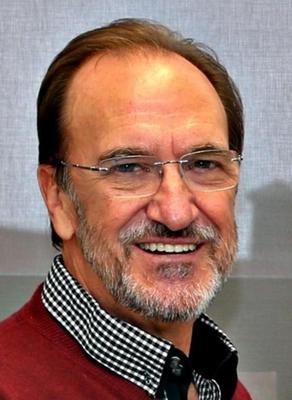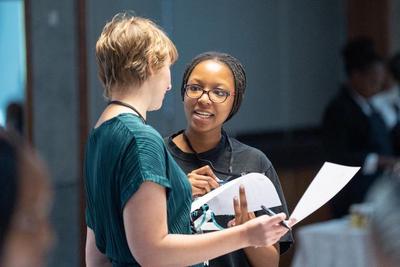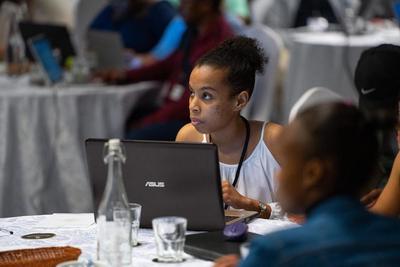Exploring digital humanities in South Africa: A discussion with Justus Roux
In a line-up that promises to be both edifying and stimulating, Prof Justus C Roux is one of the plenary speakers at DH-IGNITE. He has been a trailblazer in establishing digital infrastructure to support the development of language resources in South Africa.

Roux began his journey as a linguist specialising in African languages. He quickly realised the importance of verifiable data in research and submitted his doctoral thesis, Labialization in Sesotho: The role of phonetic data in phonological analyses, at Stellenbosch University in 1979. This groundbreaking work utilised a range of experimental techniques, including X-ray and cine-fluorographic analyses, airflow measurements in speech production, and acoustic analyses.
His focus on reliable data led to his involvement in the African Speech Technology (AST) project in 1999, which he says truly set him on the path to digital humanities (DH). AST was the first major project in Human Language Technologies (HLT) in South Africa, bringing together linguists, engineers, and computer scientists to develop speech corpora in digital format. This project was a turning point for Roux, who recognised the need for large-scale data and the development of digital software tools to enable new research and development possibilities.
“You gather digital data and develop software tools, but, so what?”
– Justus Roux

Inspired by the activities of the Alliance of Digital Humanities Organizations (ADHO), Roux attended the Digital Humanities Summer Institute at the University of Victoria, Canada, in 2014. There, he met Prof Ray Siemens and his team of presenters. He was struck by the energy of the participants and the potential of DH, which was followed by a meeting with Prof Harold Short of Kings College in London. These experiences led to the establishment of two international DH workshops in Potchefstroom in 2015 and 2016, where both Siemens and Short were keynote speakers. At the 2016 workshop, the Digital Humanities Association of Southern Africa (DHASA) was established. DHASA then organised the First and Second International Conferences respectively in 2017 (Stellenbosch) and 2019 (Pretoria). (DHASA has also started its own academic journal, which Roux sees as an important development in the field.)
“It was clear that to grow DH in the country an academic association would be necessary.”
– Justus Roux
Roux was involved in a research project at Stellenbosch University and presented a paper on it at the First International Conference of the European Language Resource Association in Granada, Spain, in 1998. He was inspired by the work done in HLT there. As his thinking about DH was developing, he and his collaborators at the AST project were especially struck by how extremely time consuming and costly an exercise data collection was in our local context. These experiences informed the then Department of Arts, Culture, Science and Technology’s Ministerial Advisory Panel’s (which he coordinated) recommendation for the establishment of a National Centre for HLT.
“Since 2002 it took several years of meetings and the creation of various interim structures when, in 2014, the then Department of Science and Technology issued a call for proposals to populate the newly anticipated South African Research Infrastructure Roadmap (SARIR). Our SADiLaR [South African Centre for Digital Language Resources] proposal was one of two successful projects from the Humanities.”
– Justus Roux
With some footwork done, Roux says the initial challenge was convincing people working in the humanities and social sciences to embrace technological advances – how it could add value to their own activities. At the time, he was involved at the Research Unit for Languages and Literature at the North-West University where he organised weekly meetings with staff and senior students exposing them to different aspects of DH – “a sort of evangelisation process”.

“See and determine your own future in a developing country where the so-called 4th Industrial Revolution is already taking place where new kinds of job opportunities are on the rise. It is important to realise that multi-skilled workers (with DH skills) will be taking up positions that may not have existed before.”
– Justus Roux
Roux urges new entrants in DH and computational social sciences to stay informed about developments, both nationally and internationally: read widely, use the internet to learn about DH projects, broaden your views, and attend programmes that could enhance technical skills for future research.
South Africa has immense room for growth in DH and CSS and, while not aiming to limit the scope (after all, language can be transformative and any knowledge can be represented in our local languages), Roux remains true to his roots as a linguist, noting that “South Africa’s eleven official languages (plus others) constitute a treasure trove for research and development”. Growth in the number of engagements, such as DH-IGNITE, is essential to equip people with the skills and create awareness of potential topics and methods to mine this treasure trove, and those which surround it.
As to the values we should foster in DH and CSS in South Africa? Prof Justus says:
“An understanding and appreciation of co-operative work of colleagues from different disciplines in contributing to the greater good.”